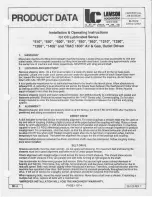
4
Symbol
description/application
Symbol form/shape
Symbol
description/application
Symbol form/shape
Read and understand
Operator's Manual.
Fuel and oil mixture
INTERNATIONAL
SYMBOLS
Symbol
description/application
Symbol form/shape
Symbol
description/application
Symbol form/shape
Hot
Surface
Carburetor adjustment
- Idle speed
Carburetor adjustment
- High speed mixture
Wear eyes, ears and
head protection
Emergency stop
Finger Severing
Carburetor adjustment
- Low speed mixture
Safety/Alert
Wear hand
protection. Use
two handed.
DO NOT smoke
near fuel.
DO NOT allow
flames or sparks
near fuel.
Wear slip
resistant foot
wear.
Engine choke
control.
Ignition
ON/OFF
Primer bulb
S
AFETY
I
NSTRUCTIONS
PERSONAL
CONDITION
AND
SAFETY
EQUIPMENT
WARNING
DANGER
Power Blower users risk injury to themselves and others if the Power Blower is used improperly and/or safety
precautions are not followed. Proper clothing and safety gear must be worn when operating a Power Blower.
Physical Condition
Your judgment and physical dexterity may not be good:
• if you are tired or sick,
• if you are taking medication,
• if you have taken alcohol or drugs.
Operate unit only if you are physically and mentally well.
Eye Protection
Wear eye protection that meets ANSI Z87.1 or CE
requirements whenever you operate the blower.
Hand Protection
Wear no-slip, heavy duty work gloves to improve your
grip on the blower handle. Gloves also reduce the
transmission of machine vibration to your hands.
Breathing Protection
Wear a face mask to protect against dust.
Hearing Protection
ECHO recommends wearing hearing protection whenever
unit is used.
Proper Clothing
Wear snug fitting, durable clothing;
• Pants should have long legs, shirts with long sleeves.
• DO NOT WEAR SHORTS,
• DO NOT WEAR TIES, SCARVES, JEWELRY.
Wear sturdy work shoes with nonskid soles;
• DO NOT WEAR OPEN TOED SHOES,
• DO NOT OPERATE UNIT BAREFOOTED.
Keep long hair away from engine and blower intake. Retain
hair with cap or net.
Hot Humid Weather
Heavy protective clothing can increase operator fatigue
which may lead to heat stroke. Schedule heavy work for
early morning or late afternoon hours when temperatures
are cooler.
Summary of Contents for PB-261L
Page 22: ...22 NOTES...





































